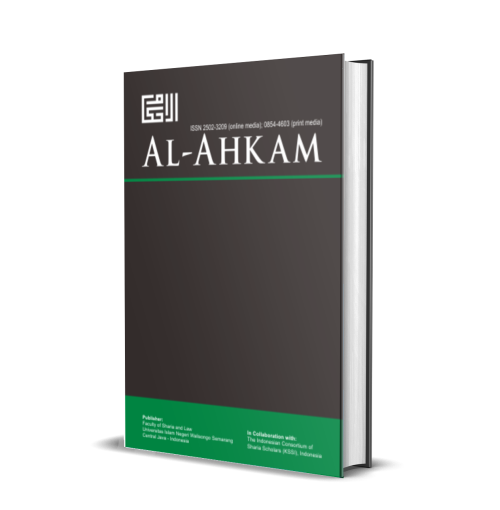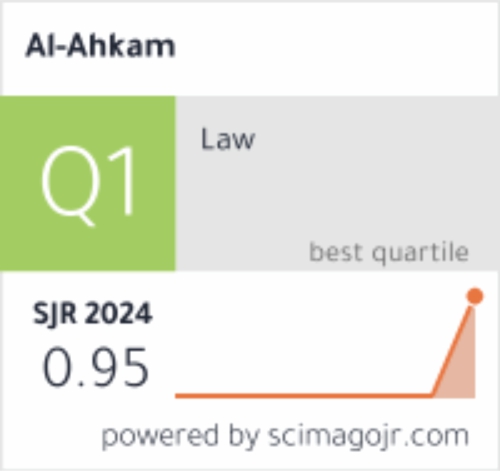FORMULA PEMELIHARAAN AGAMA (ḤIFẒ AL-DĪN) PADA MASYARAKAT DESA DERMOLO JEPARA: Implementasi Maqāṣid al-Sharī’ah dengan Pendekatan Antropologi
DOI:
https://doi.org/10.21580/ahkam.2017.27.1.1315Keywords:
ḥifẓ al-dīn, maqāṣid al-sharī’ah, written text, social textAbstract
This article aims at describing ḥifẓ al-dīn concept in Dermolo Village Jepara and its philosophical basis. Religion upholding (maintenance) as maqāṣid al-sharī’ah in Dermolo villagers is constructed through noble/ultimate value systematization from cultural hero. Religion is placed as a way of life and is not framed as unorganized religion. This is the form of religion upholding sourced from social text, in which their religiosity motivation are influenced by academic and economic level factors of the society. This form then metamorphs/change into organized religion sourced from written text of holy book as the result of ideological and cultural migration of migrants. The difference of these two types of religions has religiosity paradigm impicitation to its adherents; the first one is accommodative and the other oneis justificative. This article serves the implementation of ḥifẓ al-dīn concept as a result of maqāṣid al-sharī’ah transformation from orthodoxy to contemporary practuced by the society in Dermolo Village..
[]
Artikel ini bertujuan menggambarkan konsep ḥifẓ al-dīn pada Desa Dermolo Jepara dan landasan filosofisnya. Pemeliharaan Agama (ḥifẓ al-dīn) sebagai maqāṣid al-sharī’ah pada masyarakat Desa Dermolo dikonstruksi melalui sistematisasi nilai-nilai luhur yang diwarisi secara turun-temurun (ultimate value) dari cultural hero. Agama ditempatkan sebagai way of life dan tak terbingkai dalam wadah organisasi (unorganized religion). Inilah bentuk pemeliharaan agama yang bersumber dari teks sosial (social text), dimana motivasi keberagamaannya dipengaruhi oleh faktor tingkat pendidikan dan ekonomi masyarakatnya. Bentuk ini lalu bermetamorfosa menjadi agama organisatoris (organized religion) yang bersumber pada teks kitab suci (written text) sebagai hasil migrasi ideologis dan kultural masyarakat pendatang. Perbedaan kedua jenis agama ini berimplikasi pada paradigma keberagamaan pemeluknya, yang pertama bercorak akomodatif, sementara yang kedua bercorak justifikatif. Artikel ini akan menyajikan implementasi konsep ḥifẓ al-dīn sebagai hasil transformasi maqāṣid al-sharī’ah dari ortodoksi ke ortopraksis yang dilakukan oleh masyarakat Desa Dermolo.
Downloads
References
Abbas, Zainal Arifin, Perkembangan Fikiran terhadap Agama, Medan: Firma Islamiah, 1957.
Ali, Muhammad Abdul ‘Ati Muhammad, al-Maqāṣid al-Shar’iyyah; wa Athāruhā fi al-Fiqh al-Islāmy, Kairo: Dār al-Ḥadīth, 2002.
Alim, Yusuf Hamid, al-Maqāṣid al-‘Ammah li al-Syari’ah Al-Islāmiyyah, Kairo: Dār al-Ḥadīth, t.th.
Durkheim, Emile, Sejarah Agama (The Elementary Forms of the Religious Life), Yogyakarta: IRCiSoD, 2003.
Geertz, Clifford, Agama Jawa; Abangan, Santri, Priyayi dalam Kebudayaan Jawa, Depok: Komunitas Bambu, 2014.
Ghazali, Abd. Moqsith, Argumen Pluralisme Agama; Membangun Toleransi Berbasis al-Qur’an, Depok: Kata Kita, 2009.
Hidayat, Komarudin, Agama Punya Seribu Nyawa, Jakarta: Noura Books, 2012.
March, Andrew F., “The Maqsad of Hifz al-Din is Liberal Religious Freedom Sufficient For The Syari’ah”, dalam Islam and Civilizational Renewal, Kuala Lumpur 2.2 (Jan 2011).
__________, “Theocrats Living under Secular Law: An External Engagement with Islamic Legal Theory”, dalam The Journal of Political Philosophy, Volume 19, Number 1, 2011
Muhtarom, Zaini, Islam di Jawa dalam Perspektif Santri dan Abangan, Jakarta: Salemba Diniyah, 2002.
Mulder, Niels, Individual and Society In Java: A Cultural Analysis, Yogyakarta: Gadjah Mada University Press, 1994.
O’Dea, Thomas, Sosiologi Agama: Suatu Pengenalan Awal, Jakarta: CV. Rajawali, 1985.
Shihab, M. Quraish, Menabur Pesan Ilahi: al-Qur’an dan Dinamika Kehidupan Masyarakat, Jakarta: Lentera Hati, 2006.
Soon, Kang Young, Antara Tradisi dan Konflik: Kepolitikan Nahdlatul Ulama, Jakarta: Penerbit Universitas Indonesia, 2008.
Suparlan, Parsudi, “Kata Pengantar” dalam Agama; Dalam Analisa dan Interpretasi ja Sosiologis, Cet. III, Jakarta: Grafindo Persada, 1993.
Widagdho, Djoko, Islam dan Kebudayaan Jawa, Yogyakarta: Gamamedia, 2000.
Narasumber Wawancara
Sardjono (mantan Kepala Desa Dermolo)
Soekarno (sesepuh dan Carik Desa Dermolo)
Mulyoto (tokoh masyarakat yang menjabat sebagai pegawai di kecamatan Kembang Jepara)
Mbah Syaimah (Pemeluk agama Budha)
Teofilus Tumijan (Pendeta dan pengelola Gereja Injili di Tanah Jawa (GITJ) Dermolo.
Downloads
Published
How to Cite
Issue
Section
License
By submitting an article to the journal, the author(s) agree to transfer the published article's copyright to the journal, which will act as the publisher. This means the journal will have the right to publish the article in various forms, including reprints. The journal will maintain the publishing rights to the published articles.
In line with the license, authors and third parties (readers, researchers, and others) are allowed to share and adapt the material. In addition, the material must be given appropriate credit, provided with a link to the license, and indicated if changes were made. If authors remix, transform or build upon the material, authors must distribute their contributions under the same license as the original.




